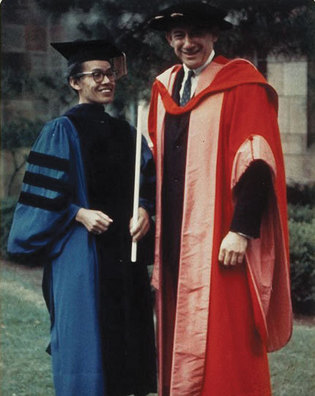 loading
loading
What’s in a name? Courtesy Schlesinger Library, Radcliffe Institute, Harvard UniversityPauli Murray ’65JSD (this page, with Law School dean Eugene Rostow ’33, ’37LLB, at her Yale commencement) was already an accomplished civil rights lawyer when she got her doctor of juridical science degree from Yale. View full imagePauli MurrayAnna Pauline (“Pauli”) Murray ’65JSD wrote that she took her “first overt stand” against racial segregation as a teenager, when she decided she would not attend a segregated college. From this beginning, Murray—activist, lawyer, scholar, poet, and priest—pursued racial and gender justice for the rest of her life, with extraordinary energy. Ruth Bader Ginsburg, who worked with her when Murray was on the board of the ACLU, described her as “independent, intelligent, poetic, feisty, determined, confident in her counsel.” The granddaughter of a slave, Murray was born in 1910 in Baltimore. At the age of three, after the death of her mother and the institutionalization of her father, she was adopted by her aunt Pauline; she spent her childhood in Durham, North Carolina, surrounded by aunts and grandparents who valued learning. In 1928 she enrolled at Hunter College (then all-female) in New York City. After graduating, she worked for the Works Progress Administration and other organizations for several years. In 1938, she tried to enroll at the all-white University of North Carolina law school, but was rejected because of her race. Two years later, in Virginia, she refused to sit on a broken seat in the back of a bus and was jailed for violating segregation laws—a little-known prelude to the movement started by Rosa Parks 15 years later. She subsequently enrolled at Howard University’s law school, becoming the valedictorian and only female graduate in the Class of 1944. Murray went on to earn a Master of Law degree from Berkeley in 1945, writing her thesis on employment rights. In 1951, she wrote States’ Laws on Race and Color, a compendium of state laws that Thurgood Marshall cited for its value to civil rights lawyers. In 1956, she was hired by the elite New York law firm of Paul, Weiss, Rifkin, Wharton, and Garrison; for many years she was the only female attorney there. John F. Kennedy appointed her to the Presidential Commission on the Status of Women’s Committee on Civil and Political Rights. In the words of Vanderbilt Divinity School dean Emilie Townes, Murray was “everywhere that things were happening.” For Murray, race was “the atmosphere one breathed from day to day, the pervasive irritant” characterizing American life. She received her doctor of juridical science at the Yale Law School in 1965 with a dissertation entitled Roots of the Racial Crisis: Prologue to Policy. She was also keenly aware of sex discrimination: in 1964 she coauthored an important article entitled, “Jane Crow and the Law: Sex Discrimination and Title VII.” In 1966, she was one of 28 founders of the National Organization for Women. Often lauded as a role model for lesbian and transgender people, Murray wrote of having a masculine sense of self that led her to seek male hormone therapy in the late 1930s and early 1940s. (A doctor offered to give her female hormones instead; she declined.) She had a deeply mutualistic, intimate relationship with her law colleague Irene Barlow for 17 years, until Barlow’s death in 1973; the two are buried under the same headstone in a Brooklyn cemetery. After working in academia, Murray enrolled at General Theological Seminary in 1973. Four years later, she became the first African American woman to be ordained as an Episcopal priest. In 2012, the Episcopal Church added Murray to its calendar of commemorations, an honor often likened to sainthood. Six years before her death from pancreatic cancer in 1985, Murray received an honorary degree from Yale with a citation that noted: “You are an inspiration to those who seek the upward way for the soul and for society. Others have always followed after.” Christiana Z. Peppard ’05MAR, ’11PhD, is an assistant professor of ethics at Fordham University.
|
|